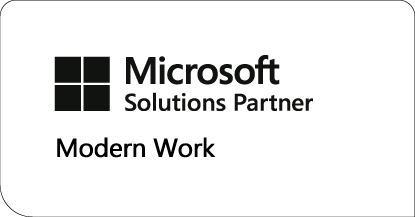






We’ve all heard the argument over On-Premises vs Cloud and the pros and cons of both. Don’t worry, this blog isn’t going to drag that debate up again. Instead, we’re going to answer: Why is Azure the right fit for any organisation running Dynamics 365 Business Central?
Firstly, let's demystify a few terminologies. Currently, Dynamics 365 Business Central comes in two flavours:
On-Premises and SaaS (Software as a Service, which by the way is hosted entirely in Azure). Bear in mind, On-Premises doesn’t necessarily mean it needs to be deployed on hardware in your own building. You can also run Dynamics 365 Business Central ‘On-Premises’ on Azure resources – this is technically an ‘On-Premises’ installation, but just not your own physical kit, we call this Platform as a Service (PaaS).
SaaS (Software as a Service) – Fully hosted in Azure where you literally just pay for Dynamics 365 Business Central on a subscription basis
PaaS (Platform as a Service) – Deployed on hosted Azure resources (Still technically an On-Premises install)
On-Premises – Your own hardware in-house or in your own datacentre.
We’ll leave the SaaS vs PaaS debate for another day – that’s an entire blog right there!
So, why can deploying Dynamics 365 Business Central in Azure (PaaS) be the right fit for Business Central? Let’s talk briefly about some of the main factors in choosing a platform - Business Continuity, Security, Cost and the Microsoft Modern Lifecycle Policy.
A fairly subjective term that covers high availability, disaster recovery, patch management and many more terms that IT folk throw about. All of these are available to you out-of-the-box in Azure for zero cost (technically the disaster recovery service is free, but you will have to pay for another disk for the replica Operating System at around £20 per month – even for an SSD Disk).
Of course, with anything in Azure you can scale up and pay for a higher level of high availability for your Virtual Machines such as hot spares, active load-balanced servers for example. For most mid-market businesses, what you get out-of-the-box will usually suffice for two reasons:
1) You can restore a failed Virtual Machine typically in minutes or failover to a replica even quicker
2) The real deal with business continuity is with your SQL Database that hosts your BC Data
For SQL, you won't need to run an expensive SQL server in Azure or even own a SQL license, instead, you’d deploy your Dynamics 365 Business Central database on an Azure SQL database (think Database as a Service).
With a standard tier Azure SQL Database, you can take advantage of Microsoft’s High availability architecture that comes as part of the service. Take a standard mid-market Azure SQL Database that over 12 months will cost you a fraction of the cost of owning your own SQL license, your Dynamics 365 Business Central database will be continuously backed up, Microsoft will take care of all the back-end server uptime and maintenance and your database will have recovery points available at every 5-minute interval for 35 days! Equate that to the resource and cost for running this in house, it’s a no-brainer.
I once had to go onsite to assist an On-Premises customer that had suffered a malware attack to assist them in getting Dynamics 365 Business Central back online. They’d also brought in a top London-based cybersecurity consultant and what I took from that experience was something that the security consultant told me (and I’ve heard several times since from people who deal with this kind of stuff day in day out) and that was to Assume Breach.
What that means is forget trying to stay one step ahead of the bad guys, you need to assume that you have already been compromised and you just don’t know it yet, or that a breach is imminent.
The question is, how well equipped or resourced are you with On-Premises perimeter security to:
a) Prevent the attack
b) Recover from it quickly
Putting your security eggs in Microsoft’s basket may sound daunting but there are tons of resources out there on the internet about how secure Azure is. If you are still in any doubt, the Pentagon seemed to think it was pretty secure - Microsoft wins $10Billion Pentagon Deal.
With all that considered it’s cost-prohibitive right? No.
Working with the right Dynamics 365 Business Central Azure Managed Services Partner to architect a solution that suits your requirements doesn’t need to be expensive.
We looked at SQL earlier, a standard mid-market Database might cost you in the region of £150 -£200 per month. If you want to buy a SQL license and your server is running 6 or 8 cores you are looking at a five-figure sum just to purchase SQL. In most CAPEX vs OPEX studies I’ve done with clients, whether you are a 5 or 150 user organisation, running Dynamics 365 Business Central in Azure wins almost every time.
This is the big one for me. So, you’ve invested in Dynamics 365 Business Central and your Partner is committed to keeping you up to date with the latest updates and upgrades according to the Modern Lifecycle Policy. Good, this is absolutely the right thing to do!
With this in mind, how will your own infrastructure keep up with the agile nature of continuous upgrades? What happens if Microsoft announces the next released build doesn’t support Windows Server 2012? How quickly can you adapt? What about if you run separate environments for QA, Staging, Dev, UAT etc, how quickly can you spin up resources for these during upgrades? Have you got the capacity, the licenses, an IT team that can keep up with these requests?
Don’t worry, as none of this will ever be a problem on Azure. As soon as new Server Operating Systems are released, you can spin one up in seconds. Need to Sandbox your Production environment? No problem, you can snapshot servers in minutes and capacity will never be an issue. Need a copy of your Live database to run a test upgrade? You're a few clicks away from running that database in any region in the world without even considering space for backups and transaction logs.
You see, Business Continuity, Security, Costs are all important factors when considering where to deploy Dynamics 365 Business Central but give some consideration to the Modern Lifecycle Policy and asking yourself:
Is your current platform ready for the challenges ahead?